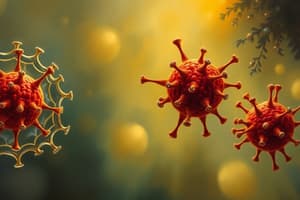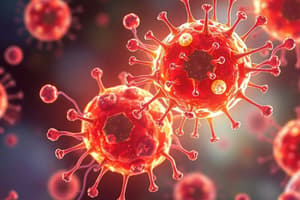Podcast
Questions and Answers
What type of cells express MHC class II?
What type of cells express MHC class II?
- Cytotoxic T cells
- All nucleated cells
- Helper T cells
- Dendritic cells, macrophages, and B cells (correct)
What type of antigen is presented by MHC class II?
What type of antigen is presented by MHC class II?
- Exogenous antigen (correct)
- Allergen
- Endogenous antigen
- Autoantigen
Which type of T cell is activated by MHC class II?
Which type of T cell is activated by MHC class II?
- Regulatory T cells
- Memory T cells
- Helper T cells (correct)
- Cytotoxic T cells
What is the role of co-stimulation in the activation of helper T cells?
What is the role of co-stimulation in the activation of helper T cells?
How do cytotoxic T cells eliminate infected cells?
How do cytotoxic T cells eliminate infected cells?
What is the role of memory T cells in the immune response?
What is the role of memory T cells in the immune response?
What is the difference between immediate and delayed hypersensitivity?
What is the difference between immediate and delayed hypersensitivity?
Why is it important to know your blood type?
Why is it important to know your blood type?
What is the primary role of T cell receptors in the immune system?
What is the primary role of T cell receptors in the immune system?
What characterizes adaptive immunity compared to innate immunity?
What characterizes adaptive immunity compared to innate immunity?
How does the immune system fail in some situations?
How does the immune system fail in some situations?
What is the significance of knowing an individual's blood type?
What is the significance of knowing an individual's blood type?
What occurs during a blood transfusion if antigens on donor red blood cells meet antibodies in the recipient's plasma?
What occurs during a blood transfusion if antigens on donor red blood cells meet antibodies in the recipient's plasma?
What is the role of MHC in T cell activation?
What is the role of MHC in T cell activation?
Which blood type can universally donate to all blood types without causing agglutination?
Which blood type can universally donate to all blood types without causing agglutination?
What can lead to the development of anti-D antibodies in an Rh- individual?
What can lead to the development of anti-D antibodies in an Rh- individual?
Which of the following is NOT a symptom of hemolytic disease of the newborn?
Which of the following is NOT a symptom of hemolytic disease of the newborn?
How do doctors typically prevent hemolytic disease of the newborn?
How do doctors typically prevent hemolytic disease of the newborn?
What is the primary function of B lymphocytes?
What is the primary function of B lymphocytes?
What prevents a Rh- mother from producing anti-D antigen antibodies in a subsequent pregnancy with an Rh+ fetus?
What prevents a Rh- mother from producing anti-D antigen antibodies in a subsequent pregnancy with an Rh+ fetus?
Which type of cell is primarily responsible for ingesting and destroying invaders?
Which type of cell is primarily responsible for ingesting and destroying invaders?
Which of the following is NOT a type of lymphocyte?
Which of the following is NOT a type of lymphocyte?
What term refers to the cells that can present antigens to initiate a specific immune response?
What term refers to the cells that can present antigens to initiate a specific immune response?
Which percentage range best represents the amount of neutrophils in the blood?
Which percentage range best represents the amount of neutrophils in the blood?
Which immune cell type is characterized as a granulocyte?
Which immune cell type is characterized as a granulocyte?
Which cells are referred to as 'polys' due to their structure?
Which cells are referred to as 'polys' due to their structure?
Flashcards
T cell activation
T cell activation
The process by which T lymphocytes become activated upon binding to an MHC-antigen complex.
Innate Immunity
Innate Immunity
A rapid and non-specific immune response that provides immediate defense against pathogens.
Adaptive Immunity
Adaptive Immunity
A slower and specific immune response that develops after exposure to an antigen.
MHC (Major Histocompatibility Complex)
MHC (Major Histocompatibility Complex)
Signup and view all the flashcards
Rh factor and pregnancy
Rh factor and pregnancy
Signup and view all the flashcards
Cross-reactions
Cross-reactions
Signup and view all the flashcards
Blood type compatibility
Blood type compatibility
Signup and view all the flashcards
Anti-D antibodies
Anti-D antibodies
Signup and view all the flashcards
Hemolytic disease of the newborn
Hemolytic disease of the newborn
Signup and view all the flashcards
Rh factor
Rh factor
Signup and view all the flashcards
MHC Class II
MHC Class II
Signup and view all the flashcards
Helper T cells
Helper T cells
Signup and view all the flashcards
Cytokines
Cytokines
Signup and view all the flashcards
MHC Class I
MHC Class I
Signup and view all the flashcards
Cytotoxic T cells
Cytotoxic T cells
Signup and view all the flashcards
Immediate hypersensitivity
Immediate hypersensitivity
Signup and view all the flashcards
Blood Types
Blood Types
Signup and view all the flashcards
Anti-D antigen antibodies
Anti-D antigen antibodies
Signup and view all the flashcards
Immune response prevention
Immune response prevention
Signup and view all the flashcards
Rh+ fetus
Rh+ fetus
Signup and view all the flashcards
Types of leukocytes
Types of leukocytes
Signup and view all the flashcards
Phagocytes
Phagocytes
Signup and view all the flashcards
Granulocytes
Granulocytes
Signup and view all the flashcards
Antigen-presenting cells
Antigen-presenting cells
Signup and view all the flashcards
Study Notes
Adaptive Immunity: T cells and The Immune System
- Adaptive immunity is a slower, specific response to pathogens than innate immunity
- T cells recognize antigens presented by MHC molecules
- T cell activation involves a cell binding to a T lymphocyte and signal transduction activating the T lymphocyte
- T cells are categorized as helper T cells, regulatory T cells, and cytotoxic T cells
- Helper T cells release cytokines to activate other immune cells
- Cytotoxic T cells kill target cells using perforin and granzymes or by activating 'death receptors'
- MHC class II molecules are found on dendritic cells, macrophages, and B cells; they're crucial for presenting exogenous antigens and activating helper T cells
- MHC class I molecules are found on all nucleated cells; they present endogenous antigens and activate cytotoxic T cells
- T cell activation is triggered by the binding of the T-cell receptor to MHC bound to antigen
- Immediate hypersensitivity is an exaggerated immune response to an allergen, involving IgE antibodies
- Knowing blood type prevents transfusion reactions
- Individuals with Rh- blood type expecting an Rh+ baby are treated with anti-D antibodies to prevent hemolytic disease of the newborn
- Antibodies act as opsonins, coating viral particles to target them for macrophages
Blood Types and Blood Donation
- ABO blood groups include type A, type B, type AB, and type O
- Type A blood has surface antigen A and anti-B antibodies
- Type B blood has surface antigen B and anti-A antibodies
- Type AB blood has both surface antigens A and B and neither anti-A nor anti-B antibodies
- Type O blood has neither surface antigen A nor B and both anti-A and anti-B antibodies
- Europeans have 85% Rh+, 15% Rh-
- Asians, Africans, Native Americans are almost 99% Rh+ and 1% Rh-
- Cross-reactions during blood transfusions occur if donor antigens meet recipient antibodies
- Type B blood donors to type A recipients cause agglutination (clumping) and hemolysis
Immune System and Disease
- An immune response can be either protective or deficient, depending on the nature of the antigen (pathogen or not)
- Antigen types that trigger a deficient response include infectious agents (causing recurrent infections), innocuous substances (causing allergies), transplanted tissue (causing tissue rejection), self-tissue (causing autoimmunity), and tumors (causing cancer)
Studying That Suits You
Use AI to generate personalized quizzes and flashcards to suit your learning preferences.




